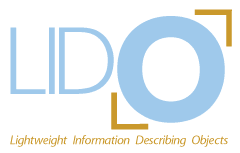|
Details: Local identifier (en) Persistent URI Deprecated URI
http://terminology.lido-schema.org/identifier_type/local_identifier Type
LIDO Term In Vocabulary
http://terminology.lido-schema.org/identifier_type Status
Finalized Label
Definition (en)
Scope Note (en)
Example (en)
Last modified
2022-12-13 Created
2010-04-30 |
Search: |
LIDO Terminology

Publisher: ICOM-CIDOC LIDO Working Group
Licence: Creative Commons Attribution 4.0 International (CC BY 4.0)
The LIDO Terminology refers to LIDO – Lightweight Information Describing Objects, the XML Schema for contributing content to cultural heritage repositories, provided by the CIDOC LIDO Working Group.
It complements the LIDO specification and is intended to further enhance the interoperability of LIDO data across different collections by introducing controlled type vocabularies for certain LIDO elements and attributes.
The LIDO Terminology is committed to the Linked Open Data paradigm by making each LIDO Term referenceable through a Uniform Resource Identifier (URI). It is recommended best practice to use the URI from the terminology.lido-schema.org/ namespace to indicate the type of a LIDO element or attribute. The primary objective of this practice is to support data providers in adapting or mapping their data structures to LIDO, thus facilitating the processing of LIDO data for service providers, increasing the interoperability of LIDO data, and supporting information retrieval across different collections.
Work on the LIDO Terminology is carried out on behalf of the CIDOC LIDO Working Group by the LIDO-DE Working Group.
Editors: Jutta Lindenthal Angela Kailus, Regine Stein.
Contributors: Claudia Andratschke, Anne Brandstetter, Barbara Fichtl, Michaela Grein, Angela Kailus, Herdis Kley, Marco Klindt, Gudrun Knaus, Romy Köhler, Jutta Lindenthal, Volker Lohrmann, Chiara Marchini, Patrick McDonough, Lisa Quade, Sophie Rölle, Julia Rössel, Nils Rohde, Timo Schleier, Karolin Schmahl, Tobias Schmiegel, Francesca Schulze, Lukas Städing, Domenic Städtler, Regine Stein, Martin Stricker, Carola Thielecke, Axel Vitzthum.
The LIDO Terminology provides for selected LIDO elements or attributes a list of terms. LIDO Terms are displayed with the T-icon in the xTree public view. A LIDO Term is identified by a URI and has at least a preferred label in English and a definition. It may also have preferred labels in other languages, alternative labels, semantic relations to other LIDO Terms, and a scope note. Wherever possible the definition is taken from or references to authoritative sources (e.g., the CIDOC Conceptual Reference Model, the Categories for the Description of Works of Art, the Art & Architecture Thesaurus or the CONA Editorial Guidelines).
Each LIDO Term is provided in several machine-readable formats (RDF, JSON, NT, TriG, Turtle) and can be accessed through a SPARQL endpoint.
Examples of the use of the LIDO Terminology can be found in the LIDO Primer: https://lido-schema.org/documents/primer/latest/lido-primer.html .
Further Informations:
- List of vocabularies of the LIDO Terminology: https://terminology-view.lido-schema.org/
- Description of the LIDO Terminology (CIDOC Website): https://cidoc.mini.icom.museum/working-groups/lido/lido-overview/lido-terminology/
- LIDO Terminology SPARQL: http://terminology.lido-schema.org/sparql
- LIDO Terminology – LOD Interface Description: https://cidoc.mini.icom.museum/working-groups/lido/lido-overview/lido-terminology/lod-interface/
- LIDO Terminology Recommendation: http://lido-schema.org/documents/terminology-recommendation.html
- LIDO Primer: https://lido-schema.org/documents/primer/latest/lido-primer.html
- LIDO Website: https://lido-schema.org

 IRI (en)
IRI (en)